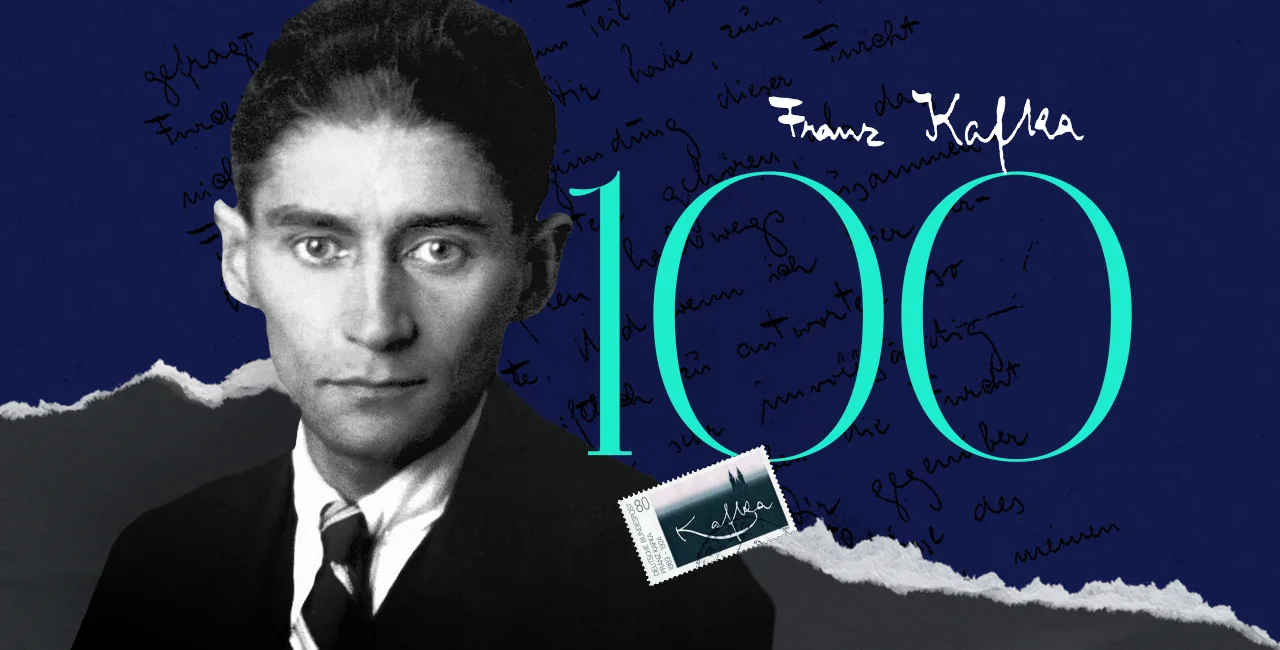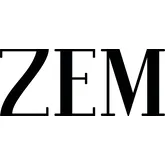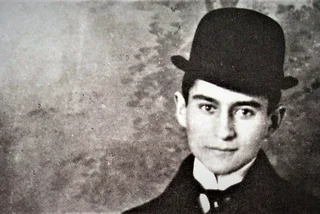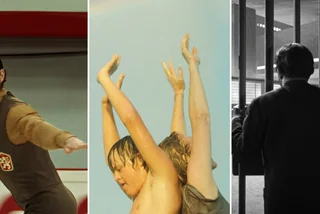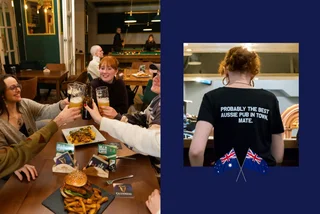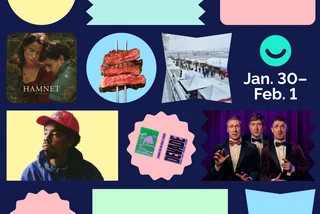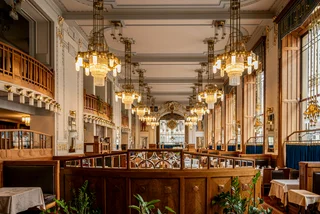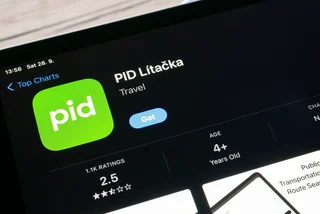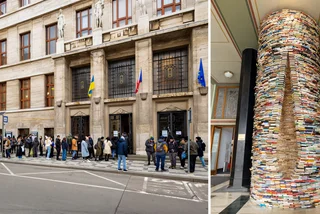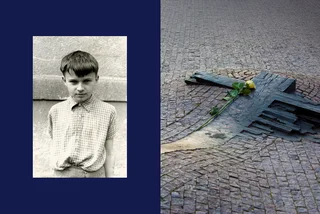Marking exactly 100 years since renowned Bohemian author Franz Kafka’s death, 2024 is abuzz with exhibitions, cultural happenings, workshops, and much more, honoring the memory of Prague’s most famous writer.
On June 3, 1924, Kafka died from complications linked to tuberculosis in a sanatorium just outside Vienna. About a week later, he was buried in the New Jewish Cemetery in Prague, the city where he had spent most of his life.
While some of his stories had already been published in literary journals, he was almost entirely unknown at the time of his death. And had it not been for his friend Max Brod’s refusal “to burn unread,” as instructed, all his manuscripts, he would most likely have remained so.
A century later, Kafka has become the most famous and widely celebrated writer from modern-day Czechia and the most closely associated with Prague.
A city over which he continues to yield an overarching, elusive, and spectral influence, as evidenced by the host of events organized here and throughout the German-speaking world to mark this anniversary year.
Here’s our selection of the best things to do to (re)discover the famously elusive Kafka.
events
Attend an art exhibit
The DOX Centre for Contemporary Art is gearing up for the launch of a wide-ranging and ambitious exhibition dedicated to the Prague-born writer: KAFKAESQUE will hold its special opening on Thursday, Feb. 8, with a special performance by the Agon Orchestra, and will remain accessible to the public throughout most of the year, until Sept. 22.
Featuring the work of dozens of leading contemporary local and international artists, KAFKAESQUE will showcase a variety of reflections and interpretations on the meaning of Kafka’s notoriously enigmatic work and poetics. “The aim of this exhibition is not to build new monuments that repeat old cliches, but to reflect Kafka’s work through the perspective of the contemporary world,” organizers explain.
A series of related events – readings, concerts, film projections – will accompany the event, so stay tuned so as not to miss the program of one of the significant happenings of the 2024 Kafka Year in Prague.
Head to a book festival
The 29th edition of the Book World Festival (Svět Knihy), a staple of literary happenings held annually in Prague, will take place on May 23-26 at the Exhibition Grounds in Prague’s Holešovice district. Uncoincidentally, German-language literature will be this year’s guest of honor, with the motto itself a direct quote by Kafka: “A book must be the axe for the frozen sea within us.”
While not exclusively dedicated to Prague’s beloved German-speaking writer, Kafka will loom large over this year’s edition, with special conferences, readings, and workshops devoted to his literary work and influences.
The organizers will release more information about the festival’s detailed program shortly but acclaimed Kafka biographer Reiner Stach will attend. At the same time, Czech musicians Kafka Band might also perform at the festival’s launch.
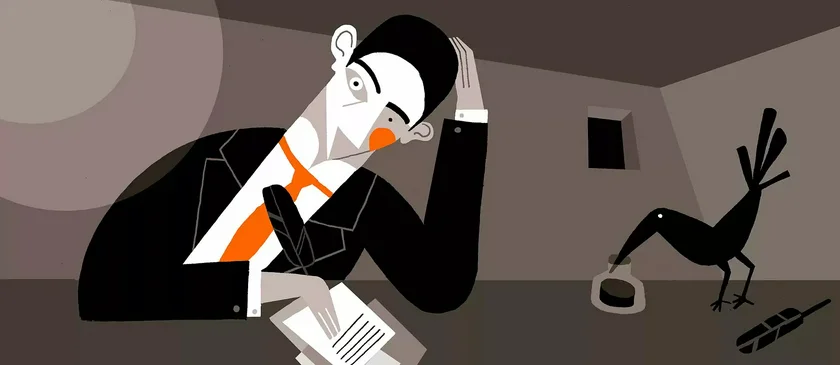
Follow the Goethe Institute
Whether directly or indirectly, the Goethe Institute will be one of the principal organizers behind most of the Kafka-themed events set to take place in Prague and Czechia this year, so we suggest you check their events calendar or stay tuned to their activities on social media so you don’t miss out.
The institute will host a special exhibition room on the Bohemian-Jewish novelist from May to September. But the highlight will come a bit later in June, with a special Kafka-Performance dinner organized on the exact anniversary of his death, on June 3, followed by a multi-day conference on “Kafka and the visuals arts” that will run until June 8. Simultaneously, the exhibition “The Photo Album of the Kafka Family” will open on June 5.
QUIZ: Which Kafka character are you?
While waiting for the complete Goethe Institute program to be released in springtime, take a custom-made psychological test created by the institute to determine which Kafka character you are. Will it be the diligent but self-destructive Joseph K. from The Trial, the seductive and independent Fräulein Bürstner, or could it be The Metamorphosis’ all-too-famous Gregor Samsa? Find out here.
Among other festivities to look forward to throughout the year, a light installation created by German visual and conceptual artist Franz John will be set up from September to October in the institute, which will also be involved in the co-production of the Kafka-themed theatre performance “Habibi Kiosk,” created within the frame of the Prague German-Language Theatre Festival in November.
Attend a performance
Care to see the dark and twisted world of Kafka come to life on stage right before your eyes? Made up of singer and actress Olga Seehafer, musician and dramaturge Jakob Fischer, and musician and actor Lorenz Schmidt, the Hamburg-based artistic trio Die Verwandlung (The Metamorphosis) will perform at Kampus Hybernská on March 19 in a dazzling performance mixing music and performance arts.
Kafka-related fun
Play a video game
Developed by the Goethe Institute with independent gaming studio Charles Games, the educational serious game Playing Kafka makes you embark on a Kafkaesque journey through the dark and mysterious world of the Prague-born writer’s imaginary world.
Accompanied by extensive learning material, this groundbreaking video game allows players to actively engage in the unfolding narrative, all the while creatively learning about Kafka and his work.
Inspired by his novel The Process, the first part of the game has been available since last June. With influences drawn from Letter to the Father and The Castle, the full version of the game will be released in May 2024 and will be available for free in the Czech, German, and English languages.
Brush up on your reading
The centenary of his death seems like a good time to brush up on your first-hand knowledge of Kafka. All his books can easily be found in virtually any bookshop or library in Prague. Still, if you’d like to dig deeper from the comfort of your couch, you can visit the Goethe Institute’s online library, giving you access to dozens of titles from or about Kafka.
The institute has also published extensive reading material about the writer via its cultural magazine Zeitgeister, with a whole series of articles allowing you to view the enigmatic Prague writer through more original lenses.
Explore his universe through multi-lingual word clouds, learn more about all the central Prague locations associated with the writer, the bizarre Kafka-derived words that made their way into the Czech language, or discover Kafka’s lesser-known passion for swimming. You can also learn more about his relationship with fashion, cinema, or sexuality, among other fascinating topics.
Whether you’re already familiar with his work or not, Franz Kafka’s Selected Stories, to be released in May by Harvard University Press, will also prove a welcome addition to your reading list. Thanks to the extensive work of translator Mark Harman, who relied on archival documents, diaries, and the author’s correspondence, more than a dozen newly translated short stories are put under a new light and embedded within their linguistical and cultural context, helping readers understand the genesis and evolution of his prose, and have a better glimpse of the man himself.
Last but not least, the comic book Komplett Kafka (Completely Kafka: A Comic Biography) by Austrian illustrator Nicolas Mahler will be released on June 4. A vagabond exhibition to showcase the artist’s acclaimed work will tour Goethe Institutes worldwide.
Watch a new biopic
One of the year’s most anticipated movies will be Franz, directed by acclaimed Polish and FAMU-educated filmmaker Agnieszka Holland. “Kafka was critical to me almost from childhood,” she said. “I read The Trial when I was 15 years old, and it was because of him that I decided to study in Prague.” Her passion for Kafka kickstarted Holland's lifelong personal and professional relationship with Prague and the Czech Republic.
With shooting set to take place in Czechia and Germany in April, the movie – starring Štěpán Klán as a young Kafka – is expected to be released in late 2024. Rather than a conventional biopic – a genre that seems quite out of step with the figure of Kafka – Holland opted for a more creative approach, describing the film as “a whimsical docu-drama in which nothing is impossible” and a patchwork of mosaics drawing from the writer’s life and fictional world.











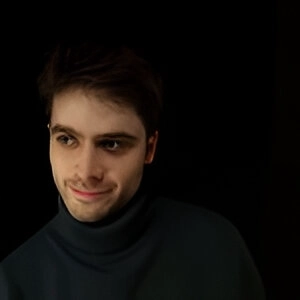
 Reading time: 6 minutes
Reading time: 6 minutes 